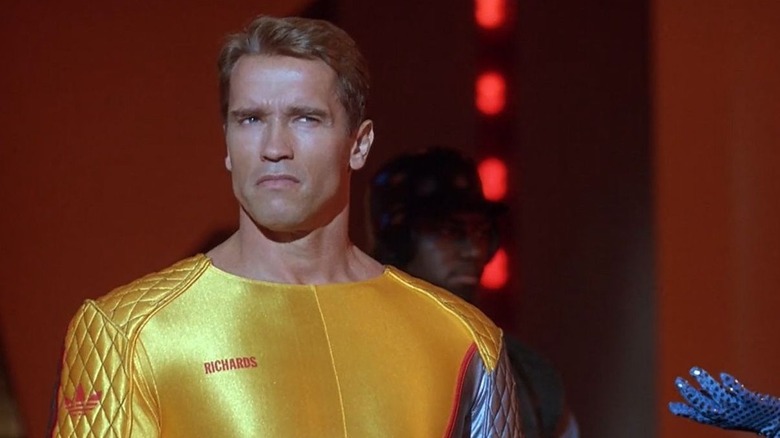Why The Running Man Isn't A Remake Of Arnold Schwarzenegger's '80s Action Classic
One of our most anticipated fall releases here at /Film is "The Running Man," directed by Edgar Wright and based on the 1982 novel by Stephen King. Like this year's other big Stephen King movie, "The Long Walk," "The Running Man" takes place in a future where survival is turned into a contest.
Ben Richards (Powell) has a sick daughter, so he takes a chance at a reality TV show contest where the prize is $1 billion dollars. The stakes of the contest, though, are life and death: To get the money, Richards has to survive for 30 days while being hunted by people all over the world. Evading detection when everyone's screen has your face on it? Good luck! And just as Richards' survival skills are being tested, "The Running Man" is going to test just how much of a movie/action star Glen Powell really is.
Wright isn't the first director to make "The Running Man" into a film. The book was adapted to the screen in 1987, starring Arnold Schwarzenegger as Richards and directed by Paul Michael Glaser. However, Wright resists labeling his movie as a "remake" of the '87 version.
Speaking to Empire magazine, Wright emphasized: "I felt that nobody needs, or wants, a straight remake of the 1987 film, but the source material had not been wholly adapted." Indeed, the '87 film is noted to be a loose adaptation. It turned a satirical story into more of a typical Arnold action flick (and King wasn't the biggest fan). Wright wants to bring King's own story to the big screen and, according to Wright himself, his and Michael Bacall's "The Running Man" script earned King's approval.
It might sound pedantic to stress that Wright's "The Running Man" isn't really a remake, but I think it's an important distinction. If you're adapting a story that's already been adapted, you're not really remaking that prior adaptation ... or are you?
How to define a remake versus a new adaptation
A useful metric for whether a new adaptation counts as a "remake" is to look at the substance of what's adapted. Here's an example: I have a pet peeve when people call the anime series "Fullmetal Alchemist: Brotherhood" a remake of the earlier 2003 "Fullmetal Alchemist" anime. The 2003 series was made before the original manga by Hiromu Arakawa was finished, so its story branched off. "Brotherhood" was, like Wright's "The Running Man" apparently is, not a remake but a new adaptation designed to be more faithful.
Or how about another movie coming out soon: Guillermo del Toro's "Frankenstein." Should that be counted as a remake of the 1931 "Frankenstein" directed by James Whale, when it's really trying to faithfully adapt Mary Shelley's novel? Yet, based on the trailer, del Toro's "Frankenstein" depicts lightning as the power which gives the Monster life. That detail comes from the Whale movie. Sometimes, movie adaptations of classic books become just as famous as the original, and so details from them become canonical, as with "Frankenstein."
Then there's another Arnold Schwarzenegger sci-fi action flick: 1990's "Total Recall," adapted from Philip K. Dick's short story, "We Can Remember It for You Wholesale." Another "Total Recall" movie was made in 2012, starring Colin Farrell. The 2012 "Total Recall" makes many changes to the setting (it cuts out the original's Mars colony and keeps the story on Earth), but the characters and structure come from the 1990 movie. So does 2012's "Total Recall" count more as a remake or another Dick adaptation?
Classifying remakes and adaptations comes with blurred lines, so it ultimately comes down to one's preference. Wright's preference is that you not view his "The Running Man" as a remake of the Schwarzenegger movie, but as a fresh adaptation of King's story.
"The Running Man" is set for theatrical release on November 14, 2025.

